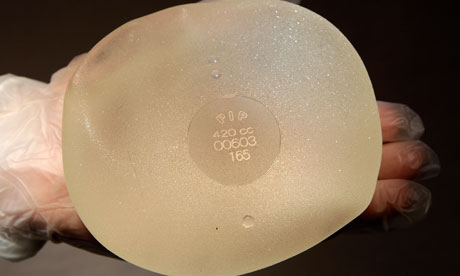
Three of the UK's biggest cosmetic surgery providers are defying government calls to offer women free removal and replacement of their breast implants, should they want it.
The Harley Medical Group used what are now known to be substandard implants made by PIP (Poly Implant Prosthèse) in operations on 13,900 women between September 2001 and March 2010. The group's founder, Mel Braham, says he would pay for the cost of new implants – but only if the NHS paid the far greater bill for the surgery.
Transform, the UK's biggest cosmetic surgery chain, used the implants on around 4,000 women. It says women will have to pay £2,800 to have them removed and replaced, which it claims is cost price. The Hospital Group has said it will only pay to replace ruptured implants.
The clinics are rejecting the moral argument of the health secretary, Andrew Lansley, whose expert group advised on Friday that women should be allowed to have any implants inserted on the NHS removed for free if they and their surgeon decided that was the right course for them.
"We believe that private healthcare providers have a moral duty to offer the same service to their patients that we will offer to NHS patients – free information, consultations, scans and removal if necessary," said Lansley.
Private clinics are trying to blame the regulator, the Medicines and Healthcare products Regulatory Authority (MHRA), for allowing the implants, which had a European quality assurance CE mark.
"PIP implants were licensed in the UK by the MHRA, an agency of the Department of Health, for use in the UK. As a result, the NHS, private clinics, private hospitals and private surgeons used these implants in cosmetic and reconstructive surgery," said the Harley Medical Group, pointing out that the expert group had not found evidence to prove they were unsafe.
The PIP implants had been filled with an industrial grade of silicone gel, used in mattresses, instead of the more expensive medical grade. Jean-Claude Mas, the owner of PIP, which has gone into liquidation, is being investigated for fraud in France. It has admitted hiding evidence from inspectors. The French government originally suspected a link to cancer, but has since found that unproven.
More than 40,000 women were given the implants, which were much cheaper than others – around £50 instead of £300.
Some private clinics have warned that replacing the PIP implants could have serious consequences for their business and even lead to closure. The cosmetic surgery industry, however, has been weathering the economic storm in 2010, say analysts Mintel and Key Note. Mintel said the market was worth £2.3bn a year and projected growth to £3.15bn by 2015. The Harley Medical Group and Transform were expanding, says Key Note. The Harley Medical Group had 28 clinics by the end of April 2010 with an ambition to reach 90. In the year to 30 June 2009, its turnover was £32.5m with pre-tax profit £1.8m. Transform's turnover was £41.4m in the year to September 2008 with a pre-tax profit of £5.2m.
Some large healthcare providers that also used the implants, including Nuffield, BMI Group and Spire, have said they will replace them for free.

